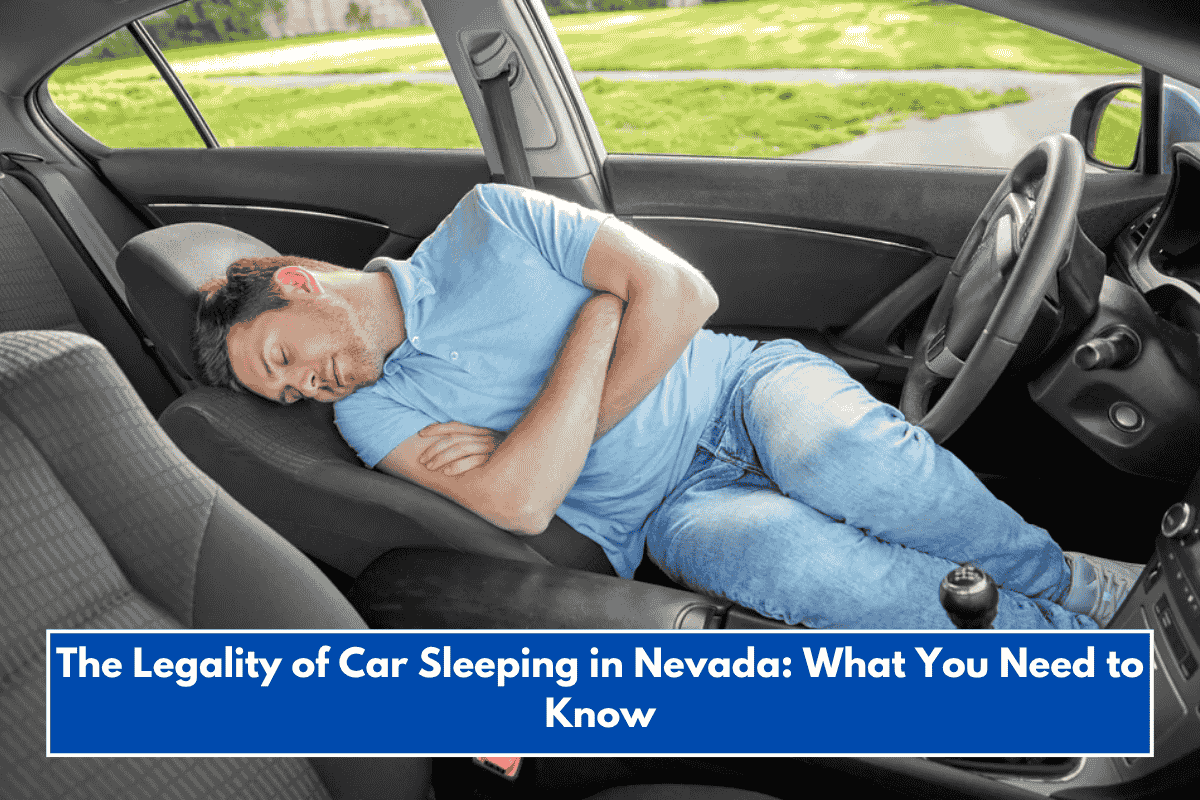If you’re considering sleeping in your car while traveling through Nevada, you’re not alone. Many travelers, campers, and even those in need of temporary shelter turn to their vehicles as a place to rest. However, the legality of car sleeping can vary by city, location, and the circumstances surrounding the situation. Let’s break down the laws and regulations you should be aware of if you plan on sleeping in your car in Nevada.
Is It Legal to Sleep in Your Car in Nevada?
In general, sleeping in your car is not illegal in Nevada, but there are certain factors that can make it problematic depending on where you are. It is crucial to understand the local regulations, as some cities and areas have specific ordinances that prohibit car sleeping under certain conditions, particularly in public spaces.
Areas Where Car Sleeping Is Restricted
- Urban Areas and City Ordinances:
In urban areas, particularly in larger cities like Las Vegas or Reno, you may encounter stricter regulations. Many cities have ordinances prohibiting overnight parking in public spaces, including sleeping in a car on public streets, parking lots, and other areas. This is primarily for reasons of safety, public order, and to prevent people from turning public spaces into informal campgrounds.- Las Vegas: In Las Vegas, for example, parking and camping overnight on public streets or in non-designated areas can be prohibited. The city has specific laws that prohibit overnight parking in certain areas, including public parking lots and streets.
- Reno: Reno also has similar regulations and may prohibit sleeping in cars in specific public areas or parking lots. It’s always advisable to check the local laws before making the decision to sleep in your vehicle.
- Private Property:
If you plan to sleep in your car on private property, such as a business parking lot or a friend’s driveway, it is usually allowed, as long as you have the property owner’s permission. Many businesses, especially large retailers like Walmart, may allow overnight parking for RVs or cars, but it’s always wise to ask for permission beforehand to avoid fines or being asked to leave. - Rest Areas and Campgrounds:
Nevada has several rest areas and designated campgrounds that cater to travelers looking to sleep in their vehicles. These places are usually safe, legal, and equipped with necessary amenities. Rest areas often provide overnight parking, though there may be restrictions on the duration of your stay (e.g., a limit of 8-12 hours). State Parks and campgrounds are excellent places to park overnight, especially if you’re looking for a more scenic or relaxed place to sleep. - Truck Stops:
Truck stops are another common and legal place to park for rest, especially for long-distance drivers. These places often have designated areas for trucks and cars to park overnight, and they offer amenities like restrooms, food, and sometimes even showers.
Why Are There Restrictions on Car Sleeping?
The restrictions on sleeping in cars are generally put in place for safety, health, and zoning reasons. The main concerns include:
- Public safety: Areas with high foot traffic or higher crime rates might not be safe for people to sleep in their vehicles, which is why local governments enforce restrictions.
- Overnight camping: Cities and towns often want to prevent individuals from camping in public spaces without following the appropriate guidelines, such as using designated campgrounds.
- Zoning regulations: Some areas have specific zoning laws that prohibit overnight parking or sleeping in cars to maintain public order and ensure that areas are used for their intended purposes.
What Can You Do to Avoid Getting Into Trouble?
If you plan on sleeping in your car in Nevada, here are some tips to ensure you don’t run into any legal issues:
- Check Local Ordinances: Before you park, check the specific regulations for that area. Many cities have online resources or you can contact the local police or city hall for information on overnight parking and car sleeping rules.
- Stay in Designated Areas: Use rest areas, campgrounds, or truck stops that are specifically designed for overnight parking. These areas are safe, legal, and often have amenities.
- Get Permission: If you’re considering parking in a private lot, make sure to ask for permission from the property owner or business to avoid fines or eviction.
- Avoid Residential Areas: Avoid parking and sleeping in residential neighborhoods. This could raise concerns with neighbors and local law enforcement, especially if it’s a regular occurrence.
Penalties for Sleeping in Your Car
If you’re caught violating local laws, penalties can range from warnings to fines. In some cases, law enforcement may ask you to move your vehicle. In extreme cases, if you’re caught repeatedly violating parking ordinances or local laws, you could face a fine or have your vehicle towed.
In Nevada, sleeping in your car is generally not illegal as long as you’re aware of local regulations and restrictions. While it’s allowed in some public spaces like rest areas or private property with permission, urban areas like Las Vegas and Reno may have stricter rules against overnight parking or car camping. Always check local ordinances, stay in designated parking areas, and prioritize your safety while on the road.
SOURCES
[1] https://courtroomproven.com/blog/is-it-legal-to-sleep-in-your-car-in-nevada/
[2] https://www.reddit.com/r/Nevada/comments/9l74mu/someone_told_me_there_is_a_nevada_state_law/
[3] https://www.kenstoverlaw.com/blog/2018/july/is-it-illegal-to-sleep-in-your-car-in-nevada-/
[4] https://www.tripadvisor.in/ShowTopic-g45963-i10-k7744665-o10-Sleeping_in_your_car_legal-Las_Vegas_Nevada.html
[5] https://courtroomproven.com/blog/is-it-legal-to-live-or-sleep-in-your-car/














